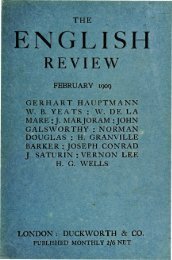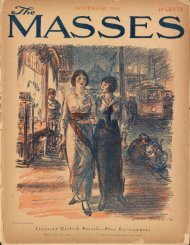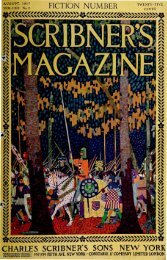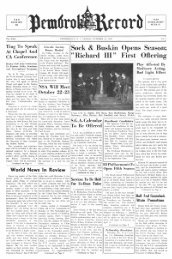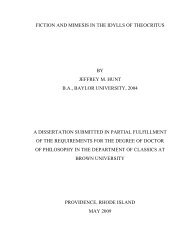View PDF - Brown University Library
View PDF - Brown University Library
View PDF - Brown University Library
- No tags were found...
You also want an ePaper? Increase the reach of your titles
YUMPU automatically turns print PDFs into web optimized ePapers that Google loves.
44 The Arctic Hospitalwoodlands and tundra are spoken of as"millions of acres waiting for the plough,"and I do not take exception to that phraseeither; they are undeniably waiting.Setting aside the mineral wealth whichis doubtless great (though probably entirelynon-existent in the region of theYukon Flats), the agricultural possibilitiesof the interior are in reality very slightcompared with its vast area, and thosewho are really familiar with the interiorknow that its main resources are neverlikely to be other than they are now—furand game and fish. But fur and gameand fish are precisely the resources thatmake a fine Indian country.Is there any sense in permitting a countryto be deprived of the only inhabitantsit is ever likely to have ? In all the wideregion north of the Yukon, and in muchelse of its interior area, a prolonged winterof rigorous inclement weather, an intractablesoil, forbid to any sober eye thesettlement of the country with farms andranches, forbid its occupation by whitemen unless they are willing to live asIndians live,, to become, economically,Indians. Speaking broadly, all the whitemen who live north of the Yukon, save ahandful here and there engaged in thetemporary occupation of placer-gold mining,are married to Indian women; andthe number is very small.I can see no economic threat to the survivalof the natives of the interior unlessthe iniquity of salmon canneries be permittedat the mouth of the Yukon, forthe fish that annually come up this greatriver constitute the staff of life of manand of man's indispensable servant, thedog. In the course of generations itmight be possible that our icthyophagous,carnivorous Indians could be trained tolive upon turnips, as the fish-canners andtheir friends so considerately suggestthey should do, but I have grave doubtsabout the dog. And certainly, to-day,to intercept and capture the migratingsalmon will bring starvation to man andbeast, just as surely as intercepting andcapturing the railway-trains that carryflour to New York would bring starvationto the metropolis.Last summer a beginning was made;a cannery was permitted at Andreafsky,just above the junction of most of thedelta mouths, and almost all the kingsalmoncaught here in the Yukon Flatsbore marks of the nets from which theyhad managed to escape a thousand milesaway. Another season the nets will bestouter or of finer mesh, and should thiswicked thing still be tolerated, despiteall our protests, a race of self-supportingand inoffensive people, scattered oversome hundreds of thousands of squaremiles, will be sacrificed.I was struck last summer by the spectacleof our Indian people contributing tothe relief of the starving Armenians,themselves dismayed at the meagre catchof net-marked salmon, and at the threatof starvation which those net-marks toldthem, plainly enough, hung over theirown heads.The only other threat to the survival ofthe race, now that intoxicating liquor isexcluded from the Territory, is the threatof disease—of the white man's diseases,smallpox and diphtheria and measles, andnow influenza—and, above all, tuberculosis.The influenza epidemic has notyet reached the interior, thank God, butwe are not without apprehension of whatnext summer's navigation may bring.The tuberculosis threat we believe we canavert; and are actively engaged in thataversion, and desire only more power toour hands along the lines we are pursuing.Already we have reason to believe thatthe corner is turned.I may, perhaps, hardly call our Indiansa "bold peasantry," and certainlythey are not "their country's pride";their country is quite indifferent to them;their country will spend $50,000,000 on arailway, but cuts down every year themodest sums asked by the Bureau ofEducation for their medical care. Suchas they are, however, a docile, gentle, industrious,intelligent, and, along theirown lines, enterprising folk, I am convincedthat "once destroyed" their place"can never be supplied"; and surely aninhabited wilderness is better worth anycountry's while than an uninhabited one.Goldsmith's hackneyed lines apply just ascogently to the Alaskan Indians to-day asthey did to his Munster crofters of nearlytwo centuries ago.



